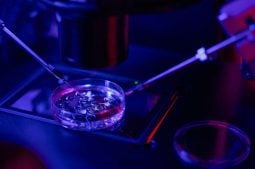
The decision to try for a baby can feel like a momentous moment in your life, whether for an individual or couple. When the desired pregnancy fails to materialise, we can feel surprised, let down and worried, especially when we have probably spent a significant amount of time taking precautions to prevent an unplanned pregnancy and waiting until the time is right. In most cases the solution is simply a matter of more time, but sometimes of course there are causes for the failure to conceive which need to be dealt with. In this article we look at the most common reasons for not getting pregnant and what you can do to address them.
Anovulation is the most common of infertility symptoms in women, but the reason you are not getting pregnant is just as likely to be to do with the male partner or other health factors or a combination of these things.
Is it hard to get pregnant? How long should I wait before seeking help?
Out of every 100 couples trying for a baby, 80 to 90 will get pregnant within 1 year. The rest will take longer, or may need help to conceive. At IVI, our standard advice is to seek medical assistance if you have not managed to conceive after one year of trying for a baby. However, depending on your age and that of your partner, you could be better advised to start the process after 6 months. When you reach the point where you have decided to seek assistance, it may be some comfort to know that currently approximately 15% of the world’s population have problems conceiving, and half of these cases are due to sperm-related problems.
Therefore for both men and women, you are far from being alone in your situation. Once you’ve consulted a medical specialist, it will become clear that this is a very common situation and one in which the potential remedies are varied and well established.
What is anovulation?
Anovulation is the medical term for when the ovaries do not release an oocyte during a menstrual cycle. This is sometimes but not always signalled by a complete lack of periods, a condition known as amenorrhoea. This is one of the most obvious infertility symptoms and one of the signs you can’t get pregnant. Chronic anovulation is a common cause of infertility, however a woman who does not ovulate at each menstrual cycle is not necessarily going through the menopause. Among its causes are stress, significant weight gain or loss, excessive production of prolactin (the hormone responsible for producing breast milk) and polycystic ovaries. These are particularly important due to their complexity and widespread nature. Approximately 35% of women experience anovulation at some time during their lives, so the condition is not uncommon. It is also frequently reversible.
Health and lifestyle factors are important here. The first steps you can take to reverse the condition include avoiding stress and not smoking, plus having a healthy balanced diet and taking a good amount of exercise. We do understand that sometimes advice like this is easier said than done, but nevertheless it bears repeating since it is so crucial in re-establishing your fertility. The same advice applies to both men and women, since an unhealthy lifestyle can contribute to both anovulation for women and having a low sperm count for men.
What if I am ovulating but still not getting pregnant?
If you are ovulating but not getting pregnant, the cause is may be polycystic ovaries (PCO). Again it is not uncommon, since around 20% of women have the condition. The term refers to an increase in the number of small cysts (antral follicles) that can be observed on the ovary’s surface when analysed in an ultrasound scan. There are many women with PCO who have no problems ovulating and getting pregnant. However, some women who have this characteristic also have the condition known as Polycystic Ovary Syndrome (PCOS). These women have irregular menstrual cycles or even a lack of menstruation; therefore they have problems getting pregnant because they do not ovulate.
Male infertility: one of the most common reasons for not getting pregnant
For around 40% of couples who are finding it hard to get pregnant, the cause of their infertility is sperm-related. A low sperm count or problems with the quality of spermatozoa is one of the most common reasons for not getting pregnant. Female factor infertility accounts for another 40% of couples struggling to conceive, with the remaining 20% of cases being unexplained. Therefore for any couple undergoing difficulties, the cause of the issue is equally likely to lie with either partner. This is all the more reason to opt for sperm analysis to find out whether a problem relating to sperm is the reason behind the infertility symptoms so that, hopefully, it can be remedied.
Low sperm count: how to check
The sperm count test is a simple procedure whereby a semen sample is analysed in a laboratory to check both quality and quantity. The analysis determines the number, activity level and shape of the spermatozoa. A commonly used benchmark for chances of conception that fall within the normal range is a sperm count of more than 39 million in the ejaculate. However it is not purely a matter of quantity, there is also the sperms’ ability to move around, referred to as motility. A good quality laboratory-based analysis will check for both of these factors.
There are signs you can’t get pregnant without assistance: what are the options?
It is impossible to make any hard and fast rules about treatment options because, naturally, every patient presents a different set of symptoms, history and current circumstances. However for both individuals and couples who are finding it hard to get pregnant, the first step is to discuss the situation with a medical specialist in fertility and assisted reproduction.
The simplest of all the assisted reproduction techniques is artificial insemination. In this procedure a semen sample, which has been prepared in advance in the laboratory, is deposited inside the woman’s uterus to increase the potential of the spermatozoa and increase the chances of the egg being fertilised. The next very common procedure is In Vitro Fertilisation (IVF). In addition there are several developments and techniques which can enhance your chances of getting pregnant and which can be an integral part of the IVF process. Here are some of the options:
The ‘basic’ IVF technique
In the simplest form of IVF, oocyte production is stimulated and a number of oocytes collected. These are mixed with prepared sperm in the laboratory to facilitate fertilisation. The resulting embryos are then selected for viability and put into the patient’s uterus for the pregnancy to proceed in the normal way.
Intracytoplasmic Sperm Injection (ICSI)
This is an assisted reproduction technique which can be included within IVF treatment, and is commonly indicated for couples diagnosed with severe male factor infertility. The man needs to provide a semen sample (or undergo a testicular biopsy, if necessary) in order to extract and select the most promising spermatozoa which will be used to fertilise the oocytes. Our video about IVF and ICSI gives a step-by-step explanation of these procedures.
MACS
MACS is a technique which allows the spermatozoa with the soundest characteristics to be selected before use in assisted reproduction treatments. It screens out the sperm which will die without achieving fertilisation and selects those with the most potential, thus increasing the possibility of conception. MACS is often used for patients who are to be treated with artificial insemination, but can be used in many cases where the need for sperm selection arises.
Egg donation
For some patients there may be conclusive signs that you can’t get pregnant with your own oocytes, whether due to age, medication or other complications. Egg donation is the process where a woman uses oocytes from a donor which are fertilised by spermatozoa from the recipient couple to produce embryos; these are transferred to the recipient in order to achieve the longed-for pregnancy. This technique can make the miracle of motherhood possible for women who would not be able to have children in any other way.
Sperm donation
In a sense the equal and opposite of egg donation, sperm donation is used in cases where it is hard to get pregnant for reasons of male infertility. In this technique, a healthy male with very high-quality semen donates some of this so that a couple with infertility problems can fulfil their dream of becoming parents. Our IVI video about semen donation sets out what is involved in the process.
Contacting us at IVI
If you are experiencing concerns about fertility, we encourage you to browse our website which has all the up-do-date information on our treatments, latest techniques and audited results. When you feel ready and would like to speak to an expert about the options for treatment, do get in touch with us at IVI. You can use our online contact form and one of our specialist advisers will get back to you. We look forward to being able to help.





28 Comments
Hi Noor, you should visit a specialist, we can’t give a medical advice without a personnal examination.
Hello, i have been trying to conceive but all in vain, i am 28 years old. i ovulate every month, a cycle of 30- 35 days. what should i do.? its now 8 years in marriage.
Hello madame, you must visit a specialist who will do some exams, tests and echographies to give an accurate diagnosis.